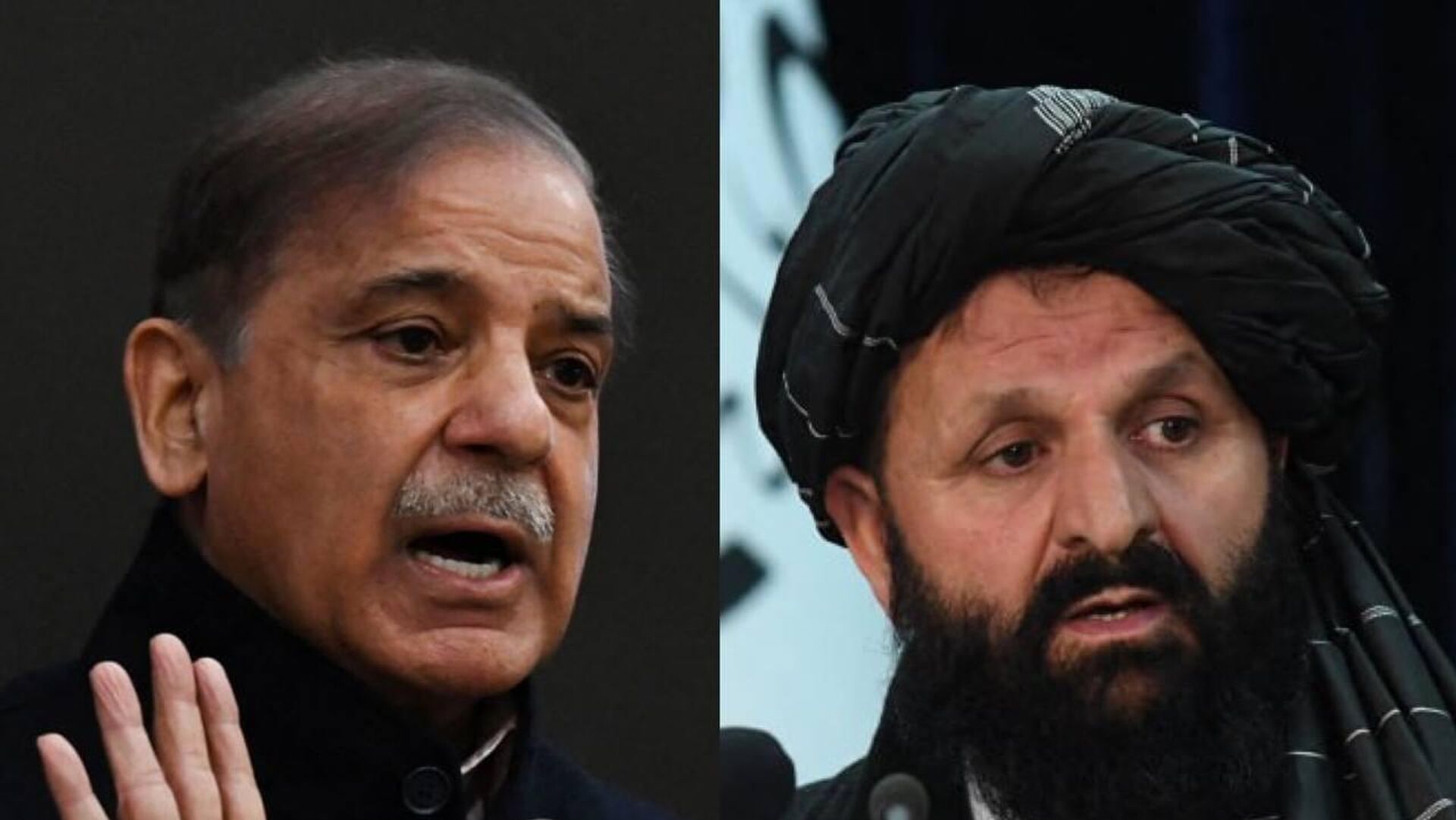https://sputniknews.in/20240722/from-allies-to-adversaries-the-evolving-dynamics-of-ttp-taliban-and-pakistan-7881374.html
From Allies to Adversaries: The Evolving Dynamics of TTP, Taliban, and Pakistan
From Allies to Adversaries: The Evolving Dynamics of TTP, Taliban, and Pakistan
Sputnik India
Pakistan and Afghanistan continue to blame one another for their internal problems and cross-border terrorism, with significant obstacles remaining, despite officially expressing a commitment to collaboratively address regional issues and respect sovereignty at the Doha Peace Deal 2021.
2024-07-22T18:35+0530
2024-07-22T18:35+0530
2024-07-24T12:07+0530
pakistan
afghanistan
islamabad
taliban
tehreek-e-taliban pakistan (ttp)
al-qaeda
osama bin laden
terrorism
kabul
https://cdn1.img.sputniknews.in/img/07e8/07/16/7884510_0:0:1280:721_1920x0_80_0_0_c4ee359ed2feaef678a9d46c0ab16519.jpg
Chances of collaboration between Islamabad and the Kabul Taliban to combat terrorism are low due to deep-rooted mistrust and conflicting interests, an expert told Sputnik India. Historical grievances, ethnic ties in border areas, and strategic differences further strain the countries relationship, according to a political expert Salman Javed.Despite a shared goal of regional stability, the persistent presence of the Tehreek-e-Taliban Pakistan (TTP*) in Afghanistan and differing approaches to militant groups hinder genuine cooperation, a director general of the Pak-Afghan Youth Forum, co-founder of South Asia Times, on Pak-Afghan matters Salman Javed highlighted during a conversation with Sputnik India.Meanwhile, after a surge of terrorist attacks, Islamabad has announced the launch of a military operation called Azm-e-Istehkam against militant groups, located in both countries' soil, according to reports from Pakistani media. However, the people of Khyber Pakhtunkhwa province organized a march to protest the military operation in the region, which led to clashes between the protesters and security personnel last week.Concerning this, the expert underscored that the exploitation of the Bannu Peace March on 19 July by hostile elements underscores the escalating crisis and the profound impact of violence in the region, and hence, the current situation is marked by a surge in terrorist attacks, including in Balochistan, and a deteriorating relationship between the Afghan Taliban and Islamabad.The pundit further expressed that the TTP's safe havens in Afghanistan pose a significant security threat to Islamabad, complicated by the Afghan Taliban's perception of the TTP as a strategic asset. This situation is further exacerbated by regional dynamics; trust issues between Pakistan and the Afghan Taliban are deep-rooted, stemming from historical and political factors, with feelings of betrayal emerging post-2021. Ethnic ties, particularly Pashtun nationalism, and accusations of harboring anti-Pakistan militants fuel mistrust. Additionally, Pakistan's concerns over regionally state's enemy influence and the impact of violence on trade and investment heighten tensions between the two.The regional instability hampers economic cooperation, disrupts trade routes, and deters foreign investments, affecting both countries' prospects for development, Javed stated. The involvement of the international community, particularly regional powers like China and Russia, is crucial to stabilize the region, the expert added,In the meantime, over the past two years, marked by frequent border skirmishes and closures of border crossings relations between Islamabad and Kabul have sharply declined. In March 2024, Pakistan launched airstrikes in Afghan territory in response to attacks that killed seven soldiers in North Waziristan, Khyber Pakhtunkhwa province, according to a foreign media report.The Afghan Taliban government, since coming to power, is itself confronting with militant groups including Islamic State-Khorasan Province (ISKP), Haqqani Network, Al-Qaeda and so on, the reports read. Both states blame each other in supporting and sponsoring militant groups.In turn, the forceful deportation of Afghan refugees from Pakistan by the government has further strained diplomatic relations between the two nations. This tension is exacerbated by Afghanistan's claims regarding the colonial-era Durand Line border, which has become a topic of discussion since the Taliban came to power.*A banned terrorist organization.
pakistan
afghanistan
islamabad
kabul
Sputnik India
feedback.hindi@sputniknews.com
+74956456601
MIA „Rossiya Segodnya“
2024
Muhammad Sharif
https://cdn1.img.sputniknews.in/img/07e7/0b/05/5257054_0:0:443:444_100x100_80_0_0_b8bd2af32be62a6eecdb4a84c7fd978f.jpg
Muhammad Sharif
https://cdn1.img.sputniknews.in/img/07e7/0b/05/5257054_0:0:443:444_100x100_80_0_0_b8bd2af32be62a6eecdb4a84c7fd978f.jpg
News
en_IN
Sputnik India
feedback.hindi@sputniknews.com
+74956456601
MIA „Rossiya Segodnya“
Sputnik India
feedback.hindi@sputniknews.com
+74956456601
MIA „Rossiya Segodnya“
Muhammad Sharif
https://cdn1.img.sputniknews.in/img/07e7/0b/05/5257054_0:0:443:444_100x100_80_0_0_b8bd2af32be62a6eecdb4a84c7fd978f.jpg
pakistan, afghanistan, islamabad, taliban, tehreek-e-taliban pakistan (ttp), al-qaeda, osama bin laden, terrorism, kabul
pakistan, afghanistan, islamabad, taliban, tehreek-e-taliban pakistan (ttp), al-qaeda, osama bin laden, terrorism, kabul
From Allies to Adversaries: The Evolving Dynamics of TTP, Taliban, and Pakistan
18:35 22.07.2024 (Updated: 12:07 24.07.2024) Pakistan and Afghanistan continue to blame one another for their internal problems and cross-border terrorism, with significant obstacles remaining, despite officially expressing a commitment to collaboratively address regional issues and respect sovereignty at the Doha Peace Deal 2021.
Chances of collaboration between Islamabad and the Kabul Taliban to combat terrorism are low due to deep-rooted mistrust and conflicting interests, an expert told Sputnik India. Historical grievances, ethnic ties in border areas, and strategic differences further strain the countries relationship, according to a political expert Salman Javed.
Despite a shared goal of regional stability, the persistent presence of the Tehreek-e-Taliban Pakistan (TTP*) in Afghanistan and differing approaches to militant groups hinder genuine cooperation, a director general of the Pak-Afghan Youth Forum, co-founder of South Asia Times, on Pak-Afghan matters Salman Javed highlighted during a conversation with Sputnik India.
"TTP has intensified its activities, frequently attacking Pakistani security forces from safe havens in Afghanistan. Recent high-profile attacks targeting Chinese nationals and interests, along with the terrorist incidents in Bannu and Dera Ismail Khan on 15 and 16 July, 2024, highlight the urgent threat we face," Javed stressed.
Meanwhile, after a surge of terrorist attacks, Islamabad has announced the launch of a military operation called Azm-e-Istehkam against militant groups, located in both countries' soil, according to reports from Pakistani media. However, the people of Khyber Pakhtunkhwa province organized a march to protest the military operation in the region, which led to clashes between the protesters and security personnel last week.
Concerning this, the expert underscored that the exploitation of the Bannu Peace March on 19 July by hostile elements underscores the escalating crisis and the profound impact of violence in the region, and hence, the current situation is marked by a surge in terrorist attacks, including in Balochistan, and a deteriorating relationship between the Afghan Taliban and Islamabad.
"The past haunts the present as Pakistan feels betrayed by the Afghan Taliban's support for the TTP. The Taliban view Islamabad's concerns as interference, denying the presence of TTP fighters on Afghan soil, despite international reports confirming their existence. While the Taliban label the TTP as Pakistan's internal issue, the group remains active in Afghanistan," Javed said.
The pundit further expressed that the TTP's safe havens in Afghanistan pose a significant security threat to Islamabad, complicated by the Afghan Taliban's perception of the TTP as a strategic asset. This situation is further exacerbated by regional dynamics; trust issues between Pakistan and the Afghan Taliban are deep-rooted, stemming from historical and political factors, with feelings of betrayal emerging post-2021. Ethnic ties, particularly Pashtun nationalism, and accusations of harboring anti-Pakistan militants fuel mistrust. Additionally, Pakistan's concerns over regionally state's enemy influence and the impact of violence on trade and investment heighten tensions between the two.
The regional instability hampers economic cooperation, disrupts trade routes, and deters foreign investments, affecting both countries' prospects for development, Javed stated. The involvement of the international community, particularly regional powers like China and Russia, is crucial to stabilize the region, the expert added,
"The future of regional security hinges on the Afghan Taliban's willingness to address Pakistan's concerns, especially regarding the TTP and dismantle terrorist networks within their borders. Failure to do so could lead to further military responses from Pakistan, risking a broader conflict and further destabilization of the region," the pundit pointed out.
In the meantime, over the past two years, marked by frequent border skirmishes and closures of border crossings relations between Islamabad and Kabul have sharply declined. In March 2024, Pakistan launched airstrikes in Afghan territory in response to attacks that killed seven soldiers in North Waziristan, Khyber Pakhtunkhwa province, according to a foreign media report.
The Afghan Taliban government, since coming to power, is itself confronting with militant groups including Islamic State-Khorasan Province (ISKP), Haqqani Network, Al-Qaeda and so on, the reports read. Both states blame each other in supporting and sponsoring militant groups.
In turn, the forceful deportation of Afghan refugees from Pakistan by the government has further strained diplomatic relations between the two nations. This tension is exacerbated by Afghanistan's claims regarding the colonial-era Durand Line border, which has become a topic of discussion since the Taliban came to power.
*A banned terrorist organization.


